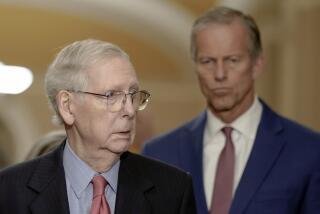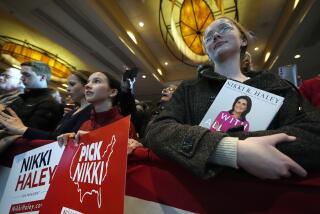McManus: Republican ‘autopsy’ reveals a divide in the party
It’s never too early to start thinking about the next presidential race — especially if you’re a political party that has managed to lose the popular vote in five of the last six elections, as the Republican Party has.
Hence the remarkable report released Monday by the Republican National Committee, which warned that the GOP looks to many voters like a party of “stuffy old men” who are “driving around in circles on an ideological cul-de-sac.”
“The Republican Party needs to stop talking to itself,” the report said. “We have lost the ability to be persuasive with — or welcoming to — those who do not agree with us on every issue.”
“Public perception of the party is at record lows,” the report noted. “Young voters are increasingly rolling their eyes at what the party represents, and many minorities wrongly think that Republicans do not like them.... When someone rolls their eyes at us, they are not likely to open their ears to us.”
I canvassed veterans of both Republican and Democratic politics to ask whether anyone could remember a similar instance of a party’s leadership publicly criticizing its own performance so harshly. None could.
The closest analogy might be the Democratic Leadership Council, the centrist group that helped steer the Democratic Party away from a stance of unreconstructed liberalism, which had lost the party five of six elections between 1968 and 1988. The council’s work paved the way for the election of Bill Clinton in 1992.
But the DLC started out as a dissident caucus in the party; this time it’s the Republican National Committee calling for self-examination.
RNC Chairman Reince Priebus, who commissioned the report, calls it an “autopsy” of the 2012 defeat, and that word says a lot about the party leadership’s willingness to scrutinize itself. But the analysis goes far beyond what went wrong: It also makes recommendations for turning the tide.
“We must embrace and champion comprehensive immigration reform. If we do not, our party’s appeal will continue to shrink.”
“We need to make sure young people do not see the party as totally intolerant of alternative points of view,” including “the rights of gays.”
“People who are flat on their back … do not care if the help comes from the private sector or the government; they just want help,” the report said. “We must make sure that the government works for those truly in need.”
And, perhaps most striking: “We have to blow the whistle at corporate malfeasance and attack corporate welfare,” it said. “We should speak out when CEOs receive tens of millions of dollars in retirement packages but middle-class workers have not had a meaningful raise in years.”
The report is nothing less than a cry of revolt against Republican orthodoxy — by the Republican establishment. But will it carry sway with the rank and file?
Not with radio pundit Rush Limbaugh. His response was to dismiss the RNC as “totally bamboozled.”
“The Republican Party lost because it’s not conservative [enough],” he said. “People say they need to moderate their tone. They don’t.”
Columnist Mona Charen wrote that the RNC sounded “a little desperate.”
“Does the GOP have a death wish?” asked the deep-thinking Donald Trump, referring to immigration reform.
The report and its reception from party faithful reminded me of Bertolt Brecht’s satirical poem about a Communist Party crackdown after an uprising by East German workers in 1953. “Would it not be easier,” he asked, “for the government to dissolve the people and elect another?”
The report in effect divided the GOP into two parties: a pragmatic party that wants to figure out a way to win elections, and an ideological party of conservative true believers who would rather hang tough than take the easy route to put a Republican in the White House.
How does a political party bridge a divide like that? Easy — by winning the White House.
“This question is going to get settled by the 2016 election,” Republican pollster Whit Ayres told me. “That’s how the Democrats settled it in 1992. There was a lot of resistance to Bill Clinton’s centrist philosophy then. There were a lot of Democrats saying we don’t need two Republican parties. But Clinton’s victory in 1992 stilled all that. Our debate will not end until we have a nominee.”
It took the Democrats three losses in a row — in 1980, 1984 and 1988 — to realize that their party needed a serious change in course. If Republicans are smart and lucky, and take their own party’s advice, they might just accelerate that timetable and take the White House back in 2016.
Follow Doyle McManus on Twitter @DoyleMcManus
More to Read
A cure for the common opinion
Get thought-provoking perspectives with our weekly newsletter.
You may occasionally receive promotional content from the Los Angeles Times.







